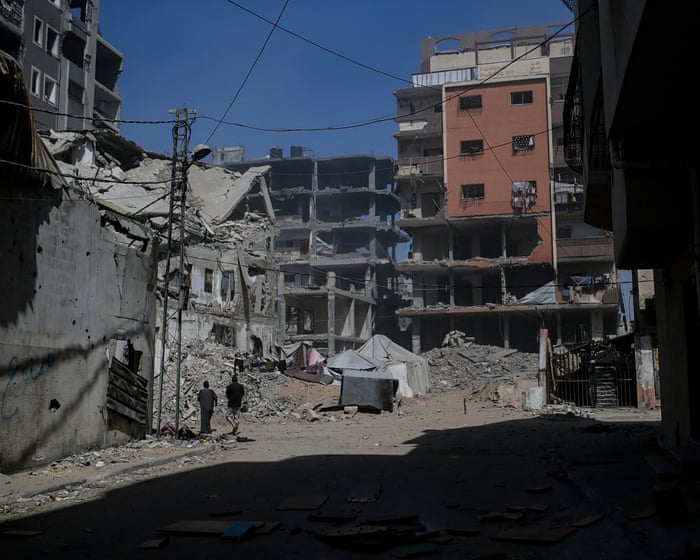A leaked confidential proposal outlines a plan for governing Gaza after the war, which could be led by former UK Prime Minister Tony Blair. This plan would sideline key Palestinian political figures and grant substantial power to its chair on major issues.
The 21-page draft, obtained by the Guardian and Haaretz, proposes that international officials take charge of Gaza’s governance and reconstruction, with Palestinians playing only supporting roles. It also suggests creating an investment and economic development authority for Gaza, using public-private partnerships and blended finance to generate profits for investors. Additionally, Gaza’s administration would be separated from the Palestinian Authority in the West Bank.
The Guardian has verified that the confidential document is authentic and was prepared within the last two weeks. While no Palestinian individuals are named, it lists several prominent international figures for potential roles, such as Egyptian billionaire Naguib Sawiris, Marc Rowan of Apollo Global Management, and Aryeh Lightstone, a former senior adviser to Donald Trump’s first ambassador to Israel. Sources indicate these names were included as examples without their consent.
This draft, called the Gaza International Transitional Authority (Gita), provides more detail on ideas reportedly promoted by Blair and Jared Kushner, Trump’s son-in-law, including that Blair is interested in leading Gaza. Palestinian critics, who have long distrusted Blair, warn that Gita would be disastrous for Palestine, creating a separate jurisdiction in Gaza apart from the West Bank’s Palestinian Authority.
The proposal was leaked ahead of a planned meeting between the US president and Israeli Prime Minister Benjamin Netanyahu, where Trump is expected to present his plan for Gaza’s postwar governance and reconstruction and demand a permanent ceasefire, leaving Netanyahu with limited options.
As previously reported, Gita would initially operate from El-Arish in Egypt, near Gaza’s southern border, and be managed by a council of seven to ten members approved by the UN Security Council. Only one member would be Palestinian, from the business or security sector, while the rest would be international figures with executive or financial experience. The council would also include strong Muslim representation to gain regional and cultural legitimacy.
The document specifies that the council would make binding decisions, approve laws and major appointments, and report to the UN Security Council. The chair would hold significant authority, setting Gita’s political and strategic direction in consultation with the board and the Palestinian Authority, and leading diplomatic and security talks with Israel, Egypt, and the US—without mentioning the Palestinian Authority in this context.
Xavier Abu Eid, a former member of the PLO’s diplomatic team, criticized the plan, saying it would allow a council mostly composed of foreigners to legislate for Palestinians in Gaza. He noted that there is already suspicion toward Tony Blair due to past Palestinian experiences with him as the Quartet representative.A representative from the UN, US, EU, and Russia mediation group stated, “The most significant issue concerns Palestine as a single political entity, which even Israel acknowledged in the Oslo Accords. This plan legally divides Gaza from the West Bank and fails to clarify how they will remain connected as one territory.”
A source who spoke to the Guardian mentioned that while Tony Blair participated in discussions, the former UK prime minister emphasized that “the guiding principle is that Gaza is for Gazans, with no population displacement.” The source added, “We do not support any proposal that involves displacing Gazans. The document specifies that any transitional governing body for Gaza would eventually transfer authority back to the Palestinian Authority, as a step toward establishing a Palestinian state.”
Tony Blair is reported to have met recently with Mahmoud Abbas, the president of the Palestinian Authority.
The draft plan’s leak comes amid recent reports of Blair’s involvement in talks about leading a postwar transitional authority in Gaza. The proposal, which is said to have White House support, would see Blair head a governing body backed by the UN and Gulf nations before returning control to the Palestinians. His office reiterated that he would not endorse any plan that displaces Gaza’s residents.
Mustafa Barghouti, general secretary of the Palestinian National Initiative and a critic of Blair, told the Washington Post, “We’ve already experienced British colonialism. He has a negative reputation here; mentioning Tony Blair immediately brings the Iraq war to mind.”
Although Blair is understood to have met with Palestinian Authority President Mahmoud Abbas recently, as well as with Trump earlier this summer, it is unclear how much Palestinians were informed about the proposal.
Before his Monday meeting with Netanyahu, Trump heightened expectations for an end to the conflict, telling reporters at the White House that the US was “very close to a deal on Gaza.” He has made similar claims in the past without results, and it remains uncertain if this time will be different.
According to three Arab officials familiar with the plan, Trump’s proposal to end the war in Gaza includes an immediate ceasefire, the release of all hostages within 48 hours, and a phased withdrawal of Israeli forces from the Palestinian territory.
Frequently Asked Questions
Of course Here is a list of FAQs about the potential for a postwar governing body for Gaza possibly headed by Tony Blair marginalizing Palestinian voices with clear and concise answers
Basic Understanding
1 What is this proposed postwar governing body for Gaza
Its an idea for a temporary internationallybacked administration to govern Gaza after the current conflict focusing on security aid distribution and rebuilding
2 Why is Tony Blairs name being mentioned
Tony Blair the former UK Prime Minister has been a Middle East peace envoy and is seen by some Western powers as a figure with the diplomatic experience to lead such a complex effort
3 What does marginalize Palestinian voices mean in this context
It means that the people who live in GazaPalestiniansmight not have a real say in their own future Decisions about their governance security and economy could be made by outside powers without their meaningful input or consent
Concerns and Implications
4 Why would a body led by someone like Tony Blair risk sidelining Palestinians
Because it could be perceived as an external topdown solution imposed by foreign powers A leader like Blair representing international interests might prioritize stability and security as defined by Israel and the West over the political aspirations and selfdetermination of Palestinians
5 Whats the main problem with not including Palestinian voices
It undermines the legitimacy and longterm sustainability of any new government If the people of Gaza dont feel ownership over their governance it can lead to resentment instability and a potential return to conflict
6 Arent the Palestinian Authority and Hamas Palestinian voices Why not just use them
This is a core difficulty Many in the international community see Hamas as a terrorist group and wont deal with it The Palestinian Authority is seen by some Palestinians as corrupt and ineffective and by Israel as compromised Finding a unified legitimate Palestinian leadership that all parties accept is a major challenge
7 Could this approach hurt the chances for a future Palestinian state
Yes potentially If a new governing structure for Gaza is created without a clear irreversible link to a broader political process for a Palestinian state it could make Gaza a permanently separate internationalized entity further fragmenting Palestinian territories and weakening the national movement
Deeper Questions and Practicalities



